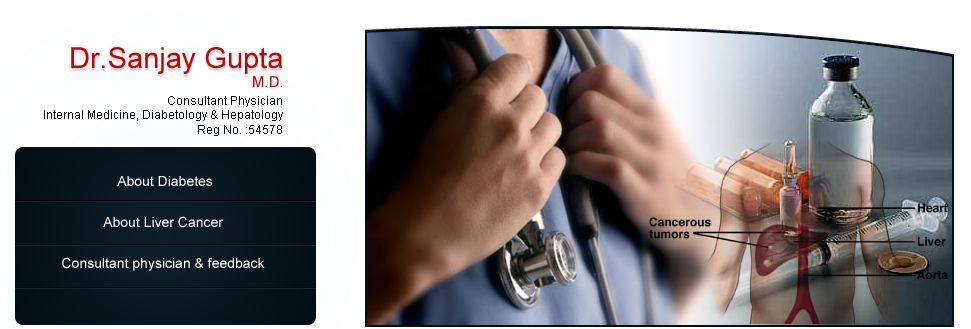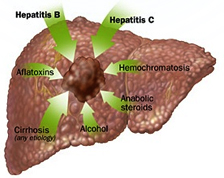

The following risk factors may increase the risk of liver cancer
Hepatitis A
Hepatitis A is caused by eating food or drinking water infected with hepatitis A virus. It does not lead to chronic disease. Almost everyone who has hepatitis A gets better.
Hepatitis B
Hepatitis B is caused by contact with the blood, semen, or other body fluid of a person infected with the hepatitis B virus (HBV). It is a serious infection that can cause liver damage, which may lead to cancer. Blood banks test all donated blood for hepatitis B, which greatly lowers the risk of getting the virus from blood transfusions.
Hepatitis C
Hepatitis C is caused by contact with the blood, semen, or other body fluid of a person infected with the hepatitis C virus (HCV). Like hepatitis B, hepatitis C can cause liver damage, which may lead to cancer. Most people who have hepatitis C develop cirrhosis of the liver. Blood banks test all donated blood for hepatitis C, which greatly lowers the risk of getting the virus from blood transfusions.
Hepatitis D
Hepatitis D develops in people already infected with hepatitis B. It is caused by the hepatitis D virus (HDV) and is spread through contact with infected blood or dirty needles, or by having unprotected sex with a person infected with HDV. Hepatitis D causes swelling of the liver.
Hepatitis E
Hepatitis E is caused by the hepatitis E virus. Hepatitis E can be spread through oral- anal contact or by drinking infected water. Hepatitis E is rare in the United States.
Hepatitis G Being infected with the hepatitis G virus has not been shown to cause liver cancer.
 Liver cancer is a disease in which malignant (cancer) cells form in
the tissues of the liver.
Liver cancer is a disease in which malignant (cancer) cells form in
the tissues of the liver.
The liver is one of the largest organs in the body. It has four lobes
and fills the upper right side of the abdomen inside the rib cage. The
liver has many important functions, including:
Filtering harmful substances from the blood so they can be passed from
the body in stools and urine.
Making bile to help digest fats from food.
Storing glycogen (sugar), which the body uses for energy.
Being infected with certain viruses can cause hepatitis and increase
the risk of liver cancer.
Hepatitis is a disease that causes inflammation (swelling) of the
liver. Damage to the liver that lasts a long time can increase the
risk of liver cancer. Hepatitis is most commonly caused by a group of
viruses called the hepatitis viruses
Prevention of Liver Cancer (Hepatocellular)
Avoiding risk factors and increasing protective factors may help
prevent cancer.
Avoiding cancer risk factors such as smoking, being overweight, and lack of exercise may help prevent certain cancers. Increasing protective factors such as quitting smoking, eating a healthy diet, and exercising may also help prevent some cancers. Talk to your doctor or other health care professional about how you might lower your risk of cancer.
The following risk factors may increase the risk of liver cancer:
Hepatitis B and C
Having chronic hepatitis B or chronic hepatitis C increases the risk of developing liver cancer. The risk is even greater for people with both hepatitis B and C. Also, the longer the hepatitis infection lasts (especially hepatitis C), the greater the risk.
Cirrhosis
The risk of developing liver cancer is increased for people who have cirrhosis, a disease in which healthy liver tissue is replaced by scar tissue. The scar tissue blocks the flow of blood through the liver and keeps it from working as it should. Chronic alcoholism and chronic hepatitis C are the most common causes of cirrhosis.
In a study of patients with chronic hepatitis C, those who were treated to lower their iron levels by having blood drawn and eating a low-iron diet were less likely to develop liver cancer than those who did not have this treatment.
Aflatoxin
The risk of developing liver cancer may be increased by eating foods that contain aflatoxin (poison from a fungus that can grow on foods, such as grains and nuts, that have not been stored properly).
The following protectivefactor may decrease the risk of liver cancer:
Hepatitis B vaccine
Preventing hepatitis B infection (by being vaccinated for hepatitis B) has been shown to lower the risk of liver cancer in children. It is not yet known if it lowers the risk in adults.
Cancer prevention clinical trials are used to study ways to prevent cancer.
